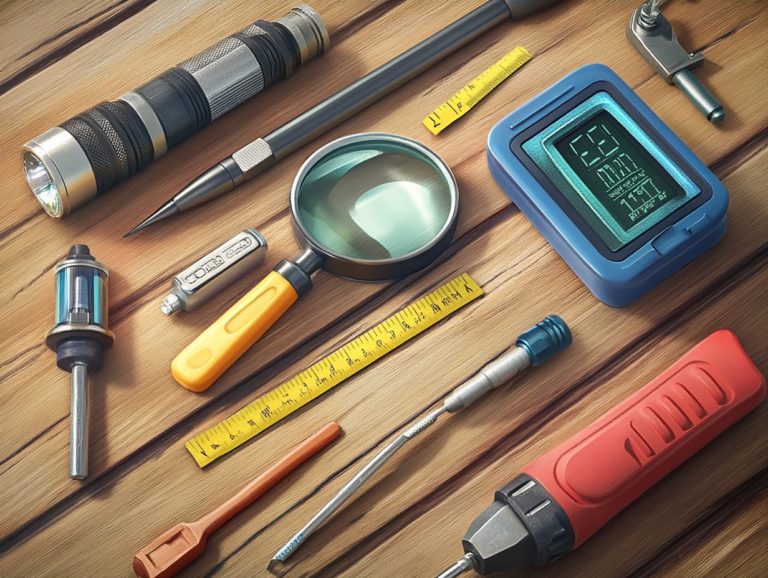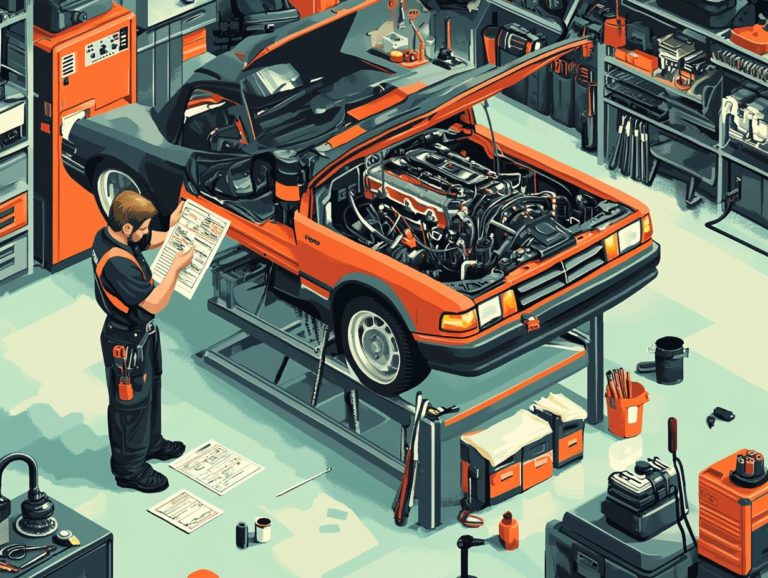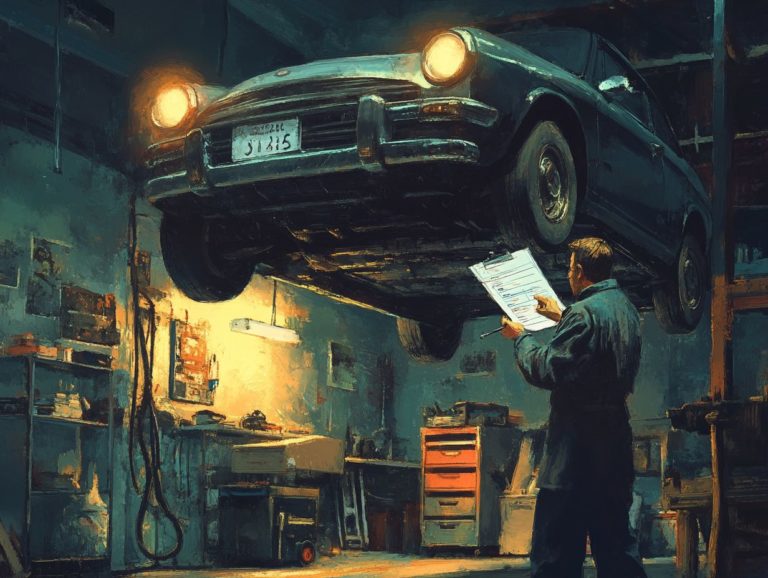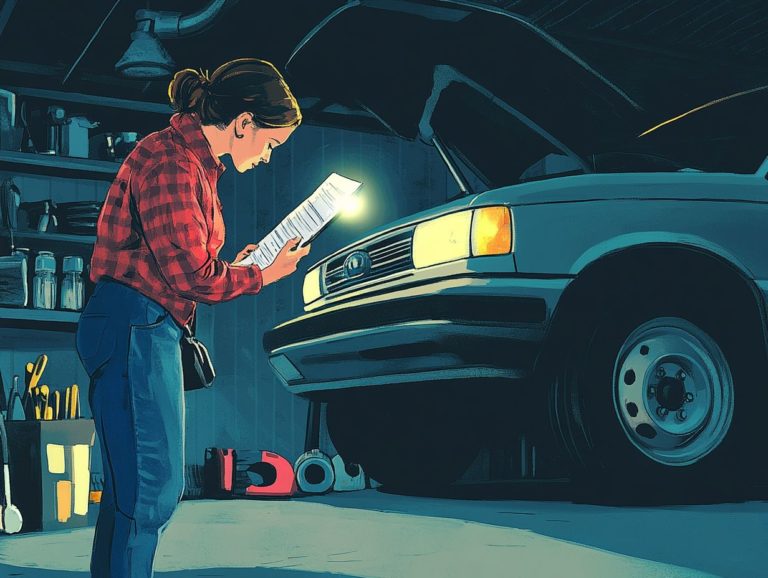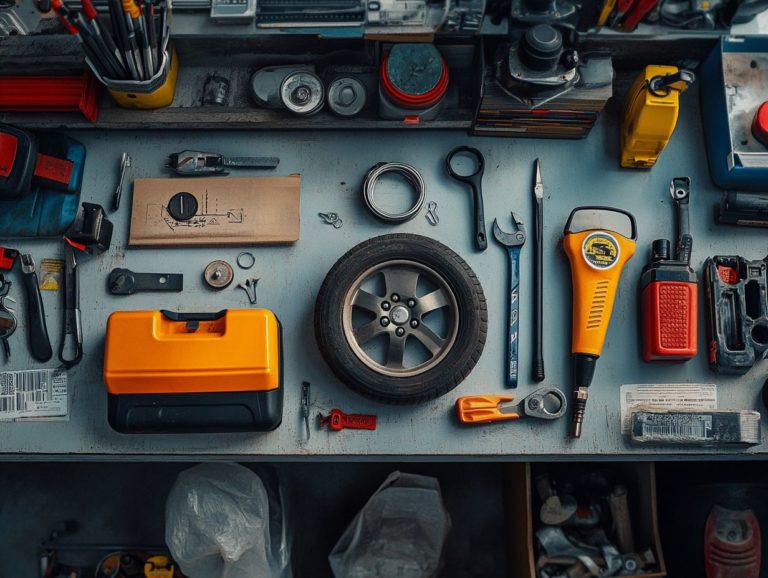How to Make the Most of Your Car Inspection
Car inspections are an essential component of vehicle maintenance that often slips under the radar. Regular inspections keep your car running smoothly and efficiently, while significantly enhancing your safety on the road.
This article delves into the importance of these inspections, guiding you on how to prepare for them and what to expect during the process. You’ll find valuable tips for passing inspections and insights into common issues that may arise afterward.
Whether you re a seasoned driver or a new car owner, grasping the ins and outs of inspections can save you time, money, and stress in the long run.
Contents
Key Takeaways:
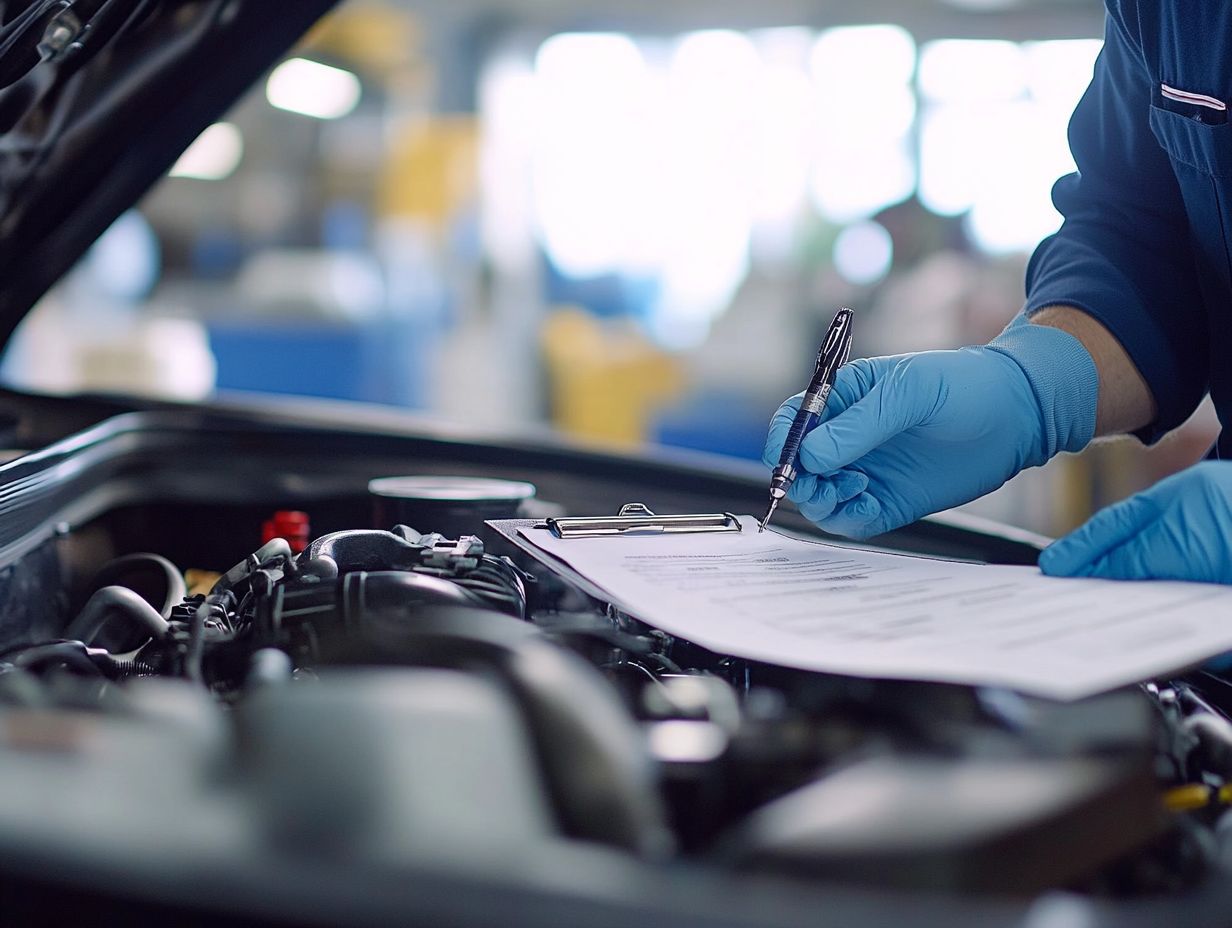
- Regular car inspections are crucial for ensuring safety and identifying potential issues before they become major problems.
- Before an inspection, check all necessary components and address any known issues to increase your chances of passing.
- Understanding the inspection process and common failure points helps prevent failures and saves time and money in the long run.
Why Car Inspections are Important
Car inspections ensure your vehicle s safety and reliability on the road. They provide a valuable opportunity to identify potential mechanical issues before they escalate into serious problems.
By committing to regular inspections, you comply with inspection laws and embrace proactive car maintenance. This process allows you to address key aspects such as fluid levels, tire condition, and brake performance.
Furthermore, possessing valid inspection certificates can streamline your interactions with insurance companies, enhancing both your driving experience and your vehicle’s overall performance.
The Purpose and Benefits of Regular Inspections
Regular vehicle inspections aren t just about ticking boxes for compliance; they re essential assessments of your vehicle’s readiness. They ensure that all critical components operate safely and efficiently.
Performing these comprehensive evaluations leads to enhanced vehicle performance, smoother rides, and improved fuel efficiency.
Routine inspections typically include crucial checks like pollution checks and brake assessments. These help you avoid potential safety hazards from overlooked components.
Consistent maintenance significantly extends the lifespan of your auto parts, saving you from costly repairs in the future.
Staying proactive with your vehicle inspections prioritizes the safety of you and your passengers while fostering a more reliable and enjoyable driving experience. To enhance your process, be sure to avoid the top 7 mistakes during a car inspection.
Preparing for a Car Inspection
Preparing for a car inspection involves meticulous steps that greatly influence the inspection’s outcome. Knowing how to prepare for a car inspection appointment ensures your vehicle adheres to all safety and regulatory standards.
Take these precautions to navigate the process with confidence and learn how to make the most of your test drive to secure a successful inspection result.
What to Do Beforehand
Before your vehicle inspection, carry out a series of checks, including ensuring your tire pressure is correct, verifying that all lights function, and performing an oil change if necessary. For a thorough experience, learn how to use a car inspection checklist effectively. This proactive approach enhances your safety and improves your vehicle’s overall performance.
- Inspect all exterior lights headlights, brake lights, and turn signals ensuring they shine brightly enough to be seen on the road.
- Check your tires for tread depth and signs of uneven wear or damage, as these can indicate misalignment or other underlying issues.
- Top off your fluids, such as coolant and windshield washer fluid. These small maintenance tasks can make a substantial difference during your vehicle’s inspection.
Thorough preparation elevates your chances of a seamless assessment.
What to Expect During a Car Inspection
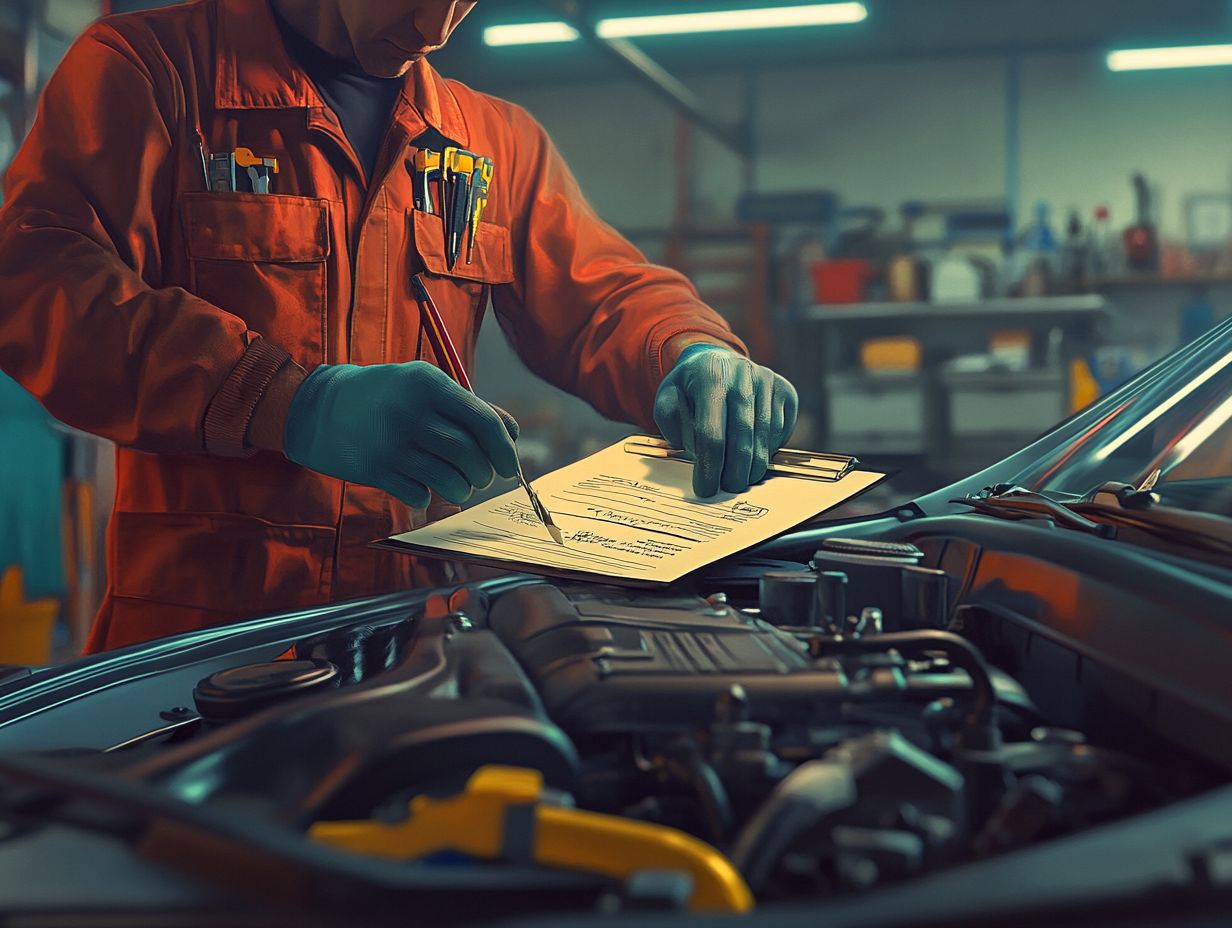
During a car inspection, expect a thorough evaluation encompassing various checks, including brake performance, windshield integrity, and pollution checks.
This meticulous process ensures your vehicle meets both safety and environmental standards.
Don’t wait! Schedule your car inspection today to ensure your safety on the road!
Inspection Checklist and Process
An inspection checklist is a vital tool in your vehicle inspection process. It ensures that every necessary component from tire condition to engine parts is thoroughly examined.
This essential document gives you the power to systematically assess key elements for vehicle safety and compliance. You ll check brakes, lights, windshield wipers, and fluid levels to ensure they meet safety standards.
Inspecting the exhaust system and suspension, which is the system that supports the vehicle and absorbs shocks, is crucial for safe driving.
With careful evaluation, you ensure every detail, from safety belts to the vehicle’s structural integrity, is up to par. Being diligent helps keep you safe on the road!
Tips for Passing a Car Inspection
You can successfully pass a car inspection by following proactive tips and strategies, such as learning how to prepare your car for inspection, that elevate your vehicle’s readiness.
By addressing common failures before they escalate into significant issues, you ll set yourself up for a smooth inspection experience.
Common Failures and How to Prevent Them
Common failures during vehicle inspections often arise from overlooked areas like inadequate tire pressure and fluid levels, as well as malfunctioning safety features. The good news is that these issues can be easily addressed to improve your vehicle’s readiness.
These problems typically stem from insufficient routine maintenance or neglecting key components before an inspection. To mitigate such failures, establish a regular maintenance schedule that includes:
- Checking tire pressure bi-weekly
- Topping off essential fluids like oil and coolant
- Testing braking systems
Inspecting wiper blades can also help you avoid unnecessary failures that could lead to more serious consequences later. By prioritizing these checks, you can enhance your inspection outcomes and significantly improve overall road safety.
What to Do After a Car Inspection
Following a car inspection, it is essential to promptly address any identified issues or necessary repairs to fully understand the key benefits of getting a car inspected.
This not only helps maintain your vehicle’s safety but also ensures you remain in compliance with inspection regulations.
Addressing Any Issues or Repairs
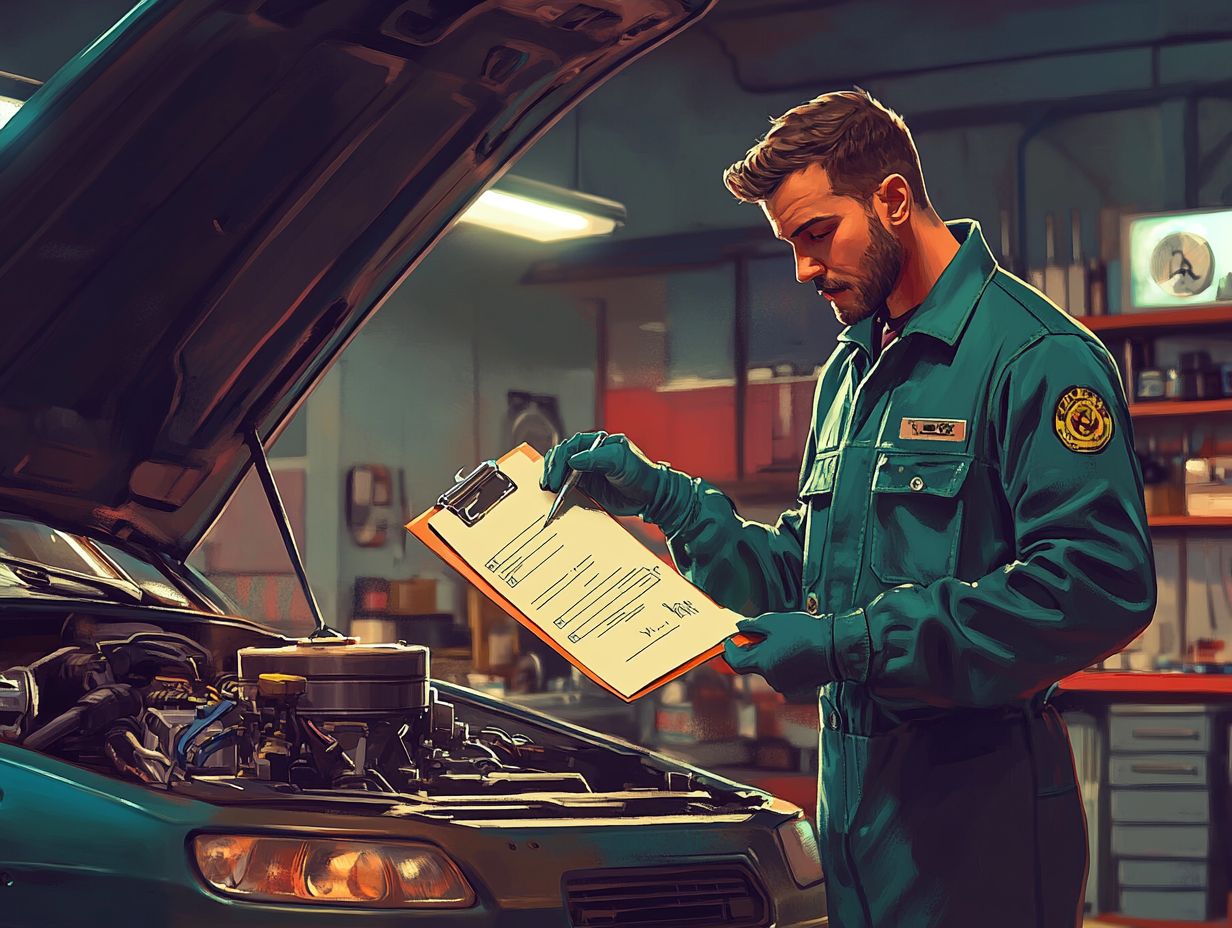
Addressing any issues or repairs identified during your vehicle inspection is essential for maintaining optimal performance and following the step-by-step guide to inspecting a car to secure a valid inspection certificate.
Understanding the outcomes of an inspection can greatly influence how you prioritize repairs. Assess the severity of each identified issue, especially those that could compromise your safety or lead to further damage if left unattended.
Elements such as brake functionality, tire condition, and fluid levels should take precedence to avoid potential hazards on the road. Timely maintenance not only ensures reliable performance but also extends the lifespan of your vehicle, ultimately saving you both time and money.
By focusing on these critical areas, you can enhance your driving experience and uphold your vehicle’s value.
How Often to Get a Car Inspection
Determining the frequency of your car inspections hinges on several factors, including the age of your vehicle, state regulations, and your unique driving habits.
Each of these elements plays a crucial role in shaping the recommended inspection schedule tailored to your needs.
Recommended Frequency for Different Types of Vehicles
How often should you inspect your vehicle? It depends on your car type, maintenance history, and local rules.
If you own a newer car with advanced safety features, it may require less frequent checks. In contrast, older models might need more attention due to wear and tear.
Driving conditions matter! If you often drive on rough roads or in extreme weather, more frequent checks are essential.
If you frequently travel long distances, be attentive to your vehicle’s needs. Listen for any unusual sounds or performance issues.
Stay ahead of the game! Regular inspections boost your safety and keep your car running longer.
Frequently Asked Questions
What is a car inspection and why is it important?
A car inspection is a detailed check of your vehicle’s overall condition, including its safety, performance, and compliance with rules for vehicle safety. It’s essential to ensure that your car is in good working condition and safe to drive.
How often should I get my car inspected?
The frequency of car inspections varies depending on your state’s regulations. Generally, it’s recommended to get your car inspected once a year or every time you renew your registration.
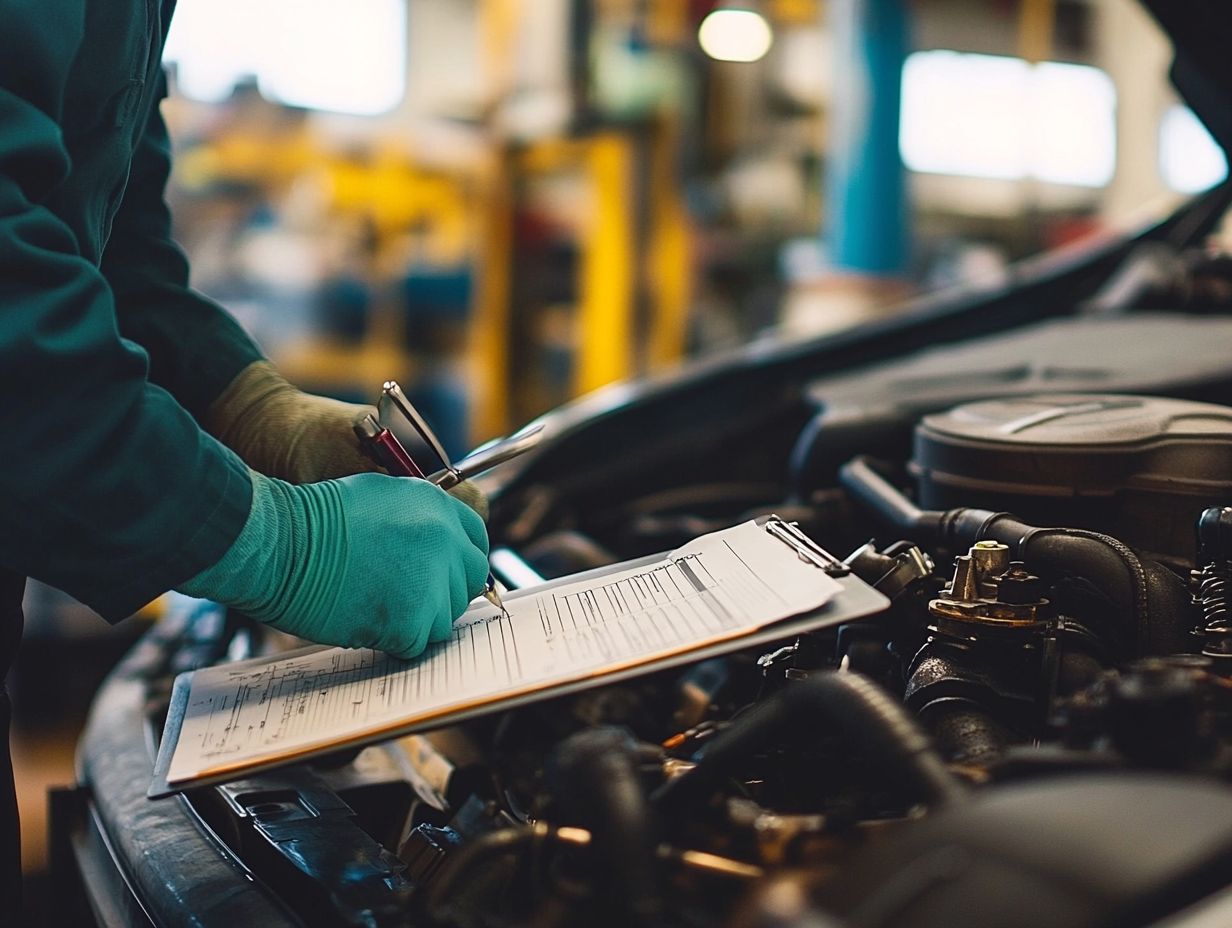
Can I do a car inspection myself?
While you can do a basic inspection, it’s not recommended. A professional mechanic has the expertise and tools to thoroughly check your car and spot issues that may not be obvious.
What should I bring with me to a car inspection?
Bring your vehicle’s registration and insurance documents, along with maintenance records or receipts for recent repairs. Having your owner’s manual handy is also helpful.
What should I expect during a car inspection?
The mechanic will perform a visual inspection of your car’s exterior, interior, and under the hood. They may also conduct a road test to assess performance. After the inspection, you’ll receive a detailed report of their findings and any recommendations.
What can I do to prepare for a car inspection?
Before your inspection, clean your car inside and out. Ensure all lights and signals are working, and check tire pressure and fluid levels. For a comprehensive approach, follow the best practices for a car inspection. If you suspect any issues, address them beforehand.

